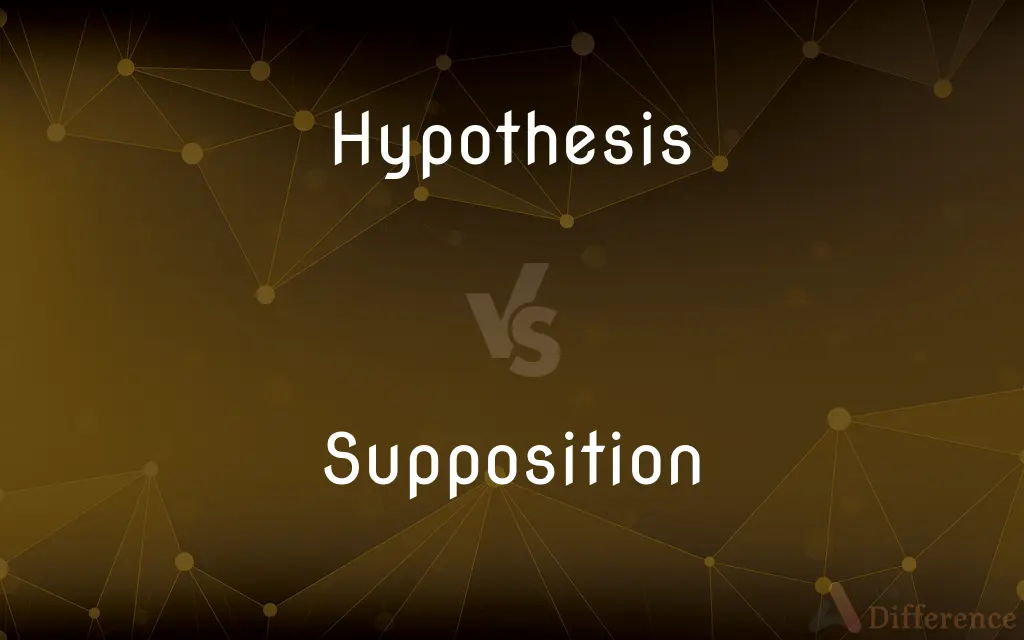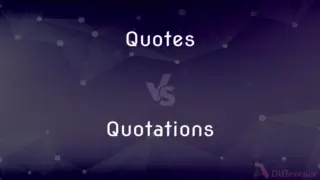Hypothesis vs. Supposition — What's the Difference?
By Tayyaba Rehman & Fiza Rafique — Published on February 3, 2024
A hypothesis is a testable prediction based on theory, used in scientific research. A supposition is an assumption or conjecture without strong evidence, often used in casual or philosophical contexts.

Difference Between Hypothesis and Supposition
Table of Contents
ADVERTISEMENT
Key Differences
A hypothesis is a foundational element in scientific research, forming a testable statement based on existing knowledge or theory. It is often formulated to be proven or disproven through experimentation and observation. In contrast, a supposition is more speculative, lacking a strong basis in empirical evidence or detailed theory, and is frequently used in reasoning or argument without the necessity of testing.
In the scientific method, a hypothesis plays a critical role by guiding experiments and shaping research questions. It is specific, measurable, and based on prior observations or established theories. Supposition, however, often serves as a starting point for discussion or theoretical exploration, not necessarily intended for empirical testing, and can be based on less concrete information.
The creation of a hypothesis usually follows a systematic approach and is an integral part of forming a research design. It is often accompanied by predictions that are directly testable. On the other hand, a supposition might arise from a hunch, a possibility, or an intuitive guess, and may not always lead to practical investigation or empirical validation.
Hypotheses are essential for advancing scientific knowledge, as they lead to experiments that can confirm or refute a theory. Suppositions, while they may not be directly testable, can still be valuable in philosophical discussions, theoretical frameworks, or as preliminary ideas that might later evolve into hypotheses.
In terms of usage, a hypothesis is more formal and used in scientific and academic contexts, requiring evidence and methodological consideration. In contrast, supposition is used more broadly and casually, often in everyday language, to express an idea or belief that does not require immediate evidence or rigorous testing.
ADVERTISEMENT
Comparison Chart
Basis
Based on theory or prior evidence
Often based on conjecture or guess
Purpose
To be tested and verified
To propose an idea or possibility
Use in Scientific Method
Central, guiding research and testing
Not typically used for direct testing
Requirement of Evidence
Requires evidence for formulation
Does not require immediate evidence
Context of Use
Scientific and academic
Broad, including casual discussion
Compare with Definitions
Hypothesis
A hypothesis aims to be validated or refuted through scientific methods.
They formulated a hypothesis about the link between sleep and memory retention.
Supposition
It's less formal than a hypothesis and often used in casual or philosophical contexts.
His supposition that all students enjoy learning was challenged by survey results.
Hypothesis
It's an integral part of the scientific method, guiding research and experimentation.
The researcher's hypothesis provided a clear direction for her study on climate change.
Supposition
A supposition might inform or precede a formal hypothesis but stands on less empirical ground.
Her supposition that stress impacts health was later developed into a research hypothesis.
Hypothesis
A hypothesis is a speculative but informed guess about a relationship between variables.
The scientist's hypothesis was that temperature affects chemical reaction rates.
Supposition
A supposition is an assumption or conjecture made without complete evidence.
His supposition that the missing book was borrowed without permission was based on intuition.
Hypothesis
It's a testable prediction, often based on some background theory.
His hypothesis was that a diet high in antioxidants would reduce disease risk.
Supposition
It's often a speculative idea or hypothesis, not necessarily requiring immediate testing.
Her supposition that aliens might exist spurred interesting debates, despite lacking proof.
Hypothesis
A tentative explanation for an observation, phenomenon, or scientific problem that can be tested by further investigation.
Supposition
The act of supposing.
Hypothesis
Something taken to be true for the purpose of argument or investigation; an assumption.
Supposition
Something supposed; an assumption.
Hypothesis
The antecedent of a conditional statement.
Supposition
Something that is supposed; an assumption made to account for known facts, conjecture.
Hypothesis
(sciences) Used loosely, a tentative conjecture explaining an observation, phenomenon or scientific problem that can be tested by further observation, investigation and/or experimentation. As a scientific term of art, see the attached quotation. Compare to theory, and quotation given there.
Supposition
The act or an instance of supposing.
Hypothesis
(general) An assumption taken to be true for the purpose of argument or investigation.
Supposition
The act of supposing, laying down, imagining, or considering as true or existing, what is known not to be true, or what is not proved.
Hypothesis
(grammar) The antecedent of a conditional statement.
Supposition
That which is supposed; hypothesis; conjecture; surmise; opinion or belief without sufficient evidence.
This is only an infallibility upon supposition that if a thing be true, it is imposible to be false.
He means are in supposition.
Hypothesis
A supposition; a proposition or principle which is supposed or taken for granted, in order to draw a conclusion or inference for proof of the point in question; something not proved, but assumed for the purpose of argument, or to account for a fact or an occurrence; as, the hypothesis that head winds detain an overdue steamer.
An hypothesis being a mere supposition, there are no other limits to hypotheses than those of the human imagination.
Supposition
A message expressing an opinion based on incomplete evidence
Hypothesis
A tentative theory or supposition provisionally adopted to explain certain facts, and to guide in the investigation of others; hence, frequently called a working hypothesis.
Supposition
A hypothesis that is taken for granted;
Any society is built upon certain assumptions
Hypothesis
A proposal intended to explain certain facts or observations
Supposition
The cognitive process of supposing
Hypothesis
A tentative theory about the natural world; a concept that is not yet verified but that if true would explain certain facts or phenomena;
A scientific hypothesis that survives experimental testing becomes a scientific theory
He proposed a fresh theory of alkalis that later was accepted in chemical practices
Supposition
A supposition can be the basis for theoretical discussion or argument.
The philosopher's supposition about human nature led to profound discussions.
Hypothesis
A message expressing an opinion based on incomplete evidence
Hypothesis
A hypothesis is a proposed explanation for a phenomenon, made as a starting point for further investigation.
Her hypothesis that increased sunlight improves plant growth led to a detailed experiment.
Common Curiosities
Is a supposition used in scientific research?
Rarely, as it's not typically designed for direct testing.
Is a hypothesis always based on science?
Yes, it's generally grounded in scientific principles and existing literature.
How is a hypothesis tested?
Through experiments, observations, and systematic research.
What defines a hypothesis?
A hypothesis is a testable prediction based on existing knowledge or theory.
What is a supposition?
A supposition is an assumption or conjecture without strong empirical backing.
Can a hypothesis be incorrect?
Yes, part of its purpose is to be tested and potentially refuted.
Do suppositions require evidence?
No, they are often based on less concrete information.
Are suppositions valuable in discussions?
Yes, they can stimulate thought and theoretical debate.
Can a hypothesis become a theory?
Yes, if repeatedly validated through research and experiments.
Can anyone formulate a hypothesis?
Yes, but it requires understanding of the relevant field and scientific method.
Can a supposition be proven?
It can lead to ideas that are testable, but as it stands, it's more conjectural.
Is a hypothesis always the start of a research project?
Often, but research can also begin with observations or questions leading to a hypothesis.
How do suppositions contribute to knowledge?
They can be starting points for inquiry or theoretical exploration.
How specific is a hypothesis?
It's usually specific and clearly states expected outcomes.
Is a supposition a weaker form of hypothesis?
It's less formal and rigorous than a hypothesis.
Share Your Discovery

Previous Comparison
Quotes vs. Quotations
Next Comparison
Sheesham Wood vs. Mango WoodAuthor Spotlight
Written by
Tayyaba RehmanTayyaba Rehman is a distinguished writer, currently serving as a primary contributor to askdifference.com. As a researcher in semantics and etymology, Tayyaba's passion for the complexity of languages and their distinctions has found a perfect home on the platform. Tayyaba delves into the intricacies of language, distinguishing between commonly confused words and phrases, thereby providing clarity for readers worldwide.
Co-written by
Fiza RafiqueFiza Rafique is a skilled content writer at AskDifference.com, where she meticulously refines and enhances written pieces. Drawing from her vast editorial expertise, Fiza ensures clarity, accuracy, and precision in every article. Passionate about language, she continually seeks to elevate the quality of content for readers worldwide.













































